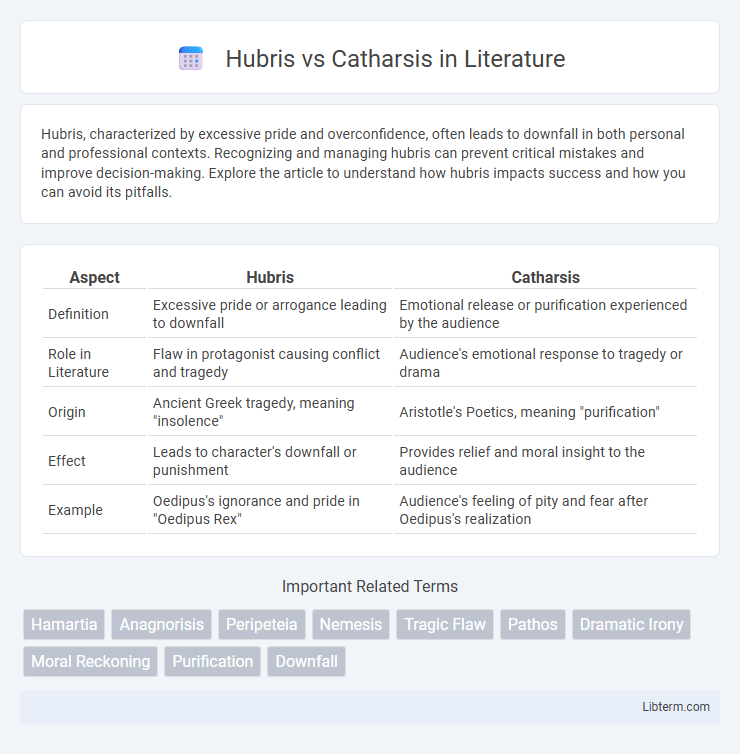Hubris, characterized by excessive pride and overconfidence, often leads to downfall in both personal and professional contexts. Recognizing and managing hubris can prevent critical mistakes and improve decision-making. Explore the article to understand how hubris impacts success and how you can avoid its pitfalls.
Table of Comparison
| Aspect | Hubris | Catharsis |
|---|---|---|
| Definition | Excessive pride or arrogance leading to downfall | Emotional release or purification experienced by the audience |
| Role in Literature | Flaw in protagonist causing conflict and tragedy | Audience's emotional response to tragedy or drama |
| Origin | Ancient Greek tragedy, meaning "insolence" | Aristotle's Poetics, meaning "purification" |
| Effect | Leads to character's downfall or punishment | Provides relief and moral insight to the audience |
| Example | Oedipus's ignorance and pride in "Oedipus Rex" | Audience's feeling of pity and fear after Oedipus's realization |
Understanding Hubris: Definition and Origins
Hubris, rooted in ancient Greek tragedy, is defined as excessive pride or arrogance that leads to a character's downfall due to defiance of divine or moral laws. This concept originates from classical literature, where hubris represents a critical flaw causing imbalance between humans and the gods, often provoking severe consequences. Understanding hubris involves recognizing its function as a moral warning against overestimating one's power and neglecting humility.
The Nature of Catharsis: Meaning and Significance
Catharsis refers to the profound emotional release experienced by an audience, often triggered by witnessing a tragic hero's journey marked by hubris, or excessive pride leading to downfall. It serves as a psychological purification, allowing individuals to confront complex emotions such as pity and fear, ultimately fostering empathy and self-awareness. This cathartic process is central to classical tragedy, highlighting the transformative power of storytelling in human emotional and moral development.
Hubris in Literature and Mythology
Hubris in literature and mythology represents excessive pride or self-confidence that often leads to a character's downfall, embodying a fundamental moral lesson about human limitations. Classic examples include Greek tragedies like Sophocles' "Oedipus Rex," where the protagonist's hubris defies divine laws, triggering inevitable punishment. This theme underscores the dangers of overstepping boundaries imposed by gods or fate, illustrating the balance between human ambition and humility.
Examples of Catharsis in Classic Narratives
In classic narratives, catharsis occurs when characters experience profound emotional release, such as Oedipus realizing the truth of his identity in Sophocles' "Oedipus Rex," which leads to his tragic downfall and audience's emotional purging. In Shakespeare's "Macbeth," the protagonist's realization of his doomed fate and the consequences of unchecked ambition evoke catharsis by highlighting the moral costs of hubris. Similarly, in Euripides' "Medea," the intense emotional suffering and subsequent actions of the characters create a powerful cathartic effect, allowing audiences to confront complex feelings of pity and fear.
Psychological Perspectives on Hubris
Hubris, rooted in excessive pride and overconfidence, often leads to impaired judgment and destructive behavior patterns in psychological contexts. This maladaptive trait can trigger a cycle of denial and defensiveness, hindering emotional regulation and interpersonal relationships. Understanding hubris from a psychological perspective reveals its role in cognitive biases and the erosion of self-awareness, which contrasts with catharsis's function of emotional release and psychological cleansing.
The Role of Catharsis in Emotional Healing
Catharsis plays a crucial role in emotional healing by facilitating the release of pent-up emotions, allowing individuals to confront and process inner turmoil effectively. In contrast to hubris, which often leads to destructive overconfidence and emotional imbalance, catharsis promotes psychological restoration and self-awareness. Therapeutic practices and literature that emphasize cathartic experiences help reduce stress, improve mental health, and foster emotional resilience.
Hubris vs Catharsis: Key Differences
Hubris represents excessive pride or arrogance that leads to a character's downfall, often seen in Greek tragedy as a fatal flaw provoking divine retribution. Catharsis refers to the emotional release or purification experienced by the audience, evoking pity and fear. The key difference lies in hubris being a destructive personal trait while catharsis is a psychological process symbolizing emotional cleansing.
How Hubris Leads to Downfall and Redemption
Hubris, characterized by excessive pride and defiance of moral limits, often triggers a protagonist's downfall by blinding them to warnings and ethical boundaries. This arrogance provokes conflict and suffering, setting the stage for catharsis--the emotional release experienced by the audience as the character confronts their flaws and consequences. Redemption emerges when the character gains insight, accepts responsibility, and seeks forgiveness, transforming hubris-induced destruction into a path toward moral restoration and growth.
The Importance of Catharsis in Personal Growth
Catharsis plays a crucial role in personal growth by allowing individuals to release pent-up emotions and confront inner conflicts, promoting psychological healing and self-awareness. Unlike hubris, which often leads to destructive pride and denial, catharsis fosters emotional clarity and resilience, enabling healthier decision-making and emotional regulation. This emotional purification process is essential for overcoming trauma, reducing stress, and achieving long-term mental well-being.
Lessons from Hubris and Catharsis for Modern Life
Hubris, characterized by excessive pride and arrogance, often leads to downfall and serves as a cautionary tale highlighting the dangers of overconfidence and ethical blindness. Catharsis, on the other hand, provides emotional purification and psychological release, promoting self-awareness and resilience in the face of life's challenges. Modern life benefits by balancing humility with introspection, using lessons from hubris to avoid destructive behavior and catharsis to foster emotional healing and personal growth.
Hubris Infographic

 libterm.com
libterm.com